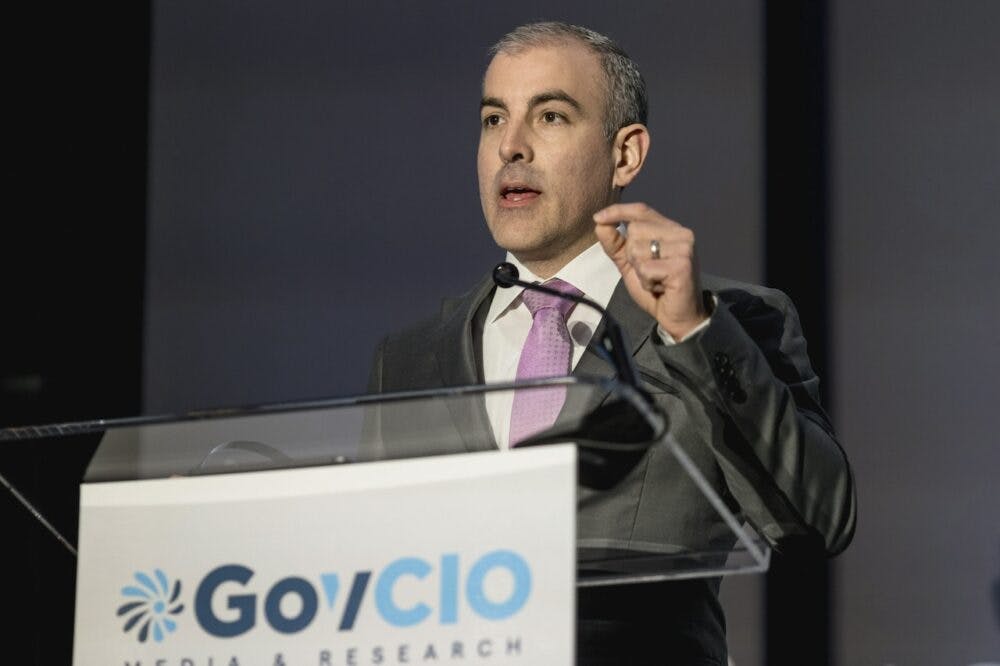How HHS OIG Helps CMS Combat Medical Identity Theft
Audits and evaluations are helping the agency detect and prevent identity fraud.

To combat pandemic-related fraud at the Centers for Medicare & Medicaid Services (CMS), the Department of Health and Human Services’ Office of the Inspector General (HHS OIG) partnered with the Department of Justice (DOJ) to conduct outreach campaigns to educate the public about emerging schemes. These alerts also provide information resources like contact information for reporting suspected fraud and tips on how to protect against the schemes.
“OIG’s Office of Investigations conducts criminal, civil and administrative investigations of fraud and misconduct related to HHS programs, operations and beneficiaries,” Jon-Paul Correira, HHS OIG’s assistant special agent in charge and director of inspections and investigative policy, said during AFCEA’s FedID Forum. “One common element is that many of these fraud schemes include theft of the identities of beneficiaries and/or providers.”
Medical identity theft happens when fraudsters steal or use a patient’s or provider’s medical identifying information, like a Medicare identification number, to submit fraudulent claims to Medicare and other health insurers without authorization.
CMS receives approximately 800 identity theft related calls every month. This type of theft can create patient safety risks and impose financial burdens on beneficiaries and providers. Fraudsters can also use this information to steal identities.
“In fiscal year 2020, OIG closed 107 cases that involved an allegation of identity theft. These cases resulted in 75 indictments, 91 criminal actions, 8 civil actions and more than $52 million in HHS monetary receivables,” Correira said.
COVID-19 created more opportunities for fraudsters to take advantage of new weaknesses. Scammers used the pandemic to send phone calls and texts to beneficiaries regarding free COVID-19 tests, cures, relief kits, vaccination appointments, fake vaccination cards and HHS COVID-19 grants to entice beneficiaries to provide personal information.
“It is the same type of scheme they’ve always used, but now they’re using the fear of the virus to initiate conversation,” Correira said.
OIG also maintains a robust cybersecurity portfolio that supports oversight of access controls. Correira said that his office is focusing on strengthening program integrity and securing protected health information as cyberattacks intensify.
“[These] are proven ways to prevent possible identity fraud by protecting unauthorized access to this information,” Correira said.
HHS OIG conducts various audits and evaluations to protect beneficiaries’ information. The agency recently worked with the Social Security Administration (SSA) and the Government Accountability Office (GAO) to change Medicare identification numbers and remove associations with patients’ Social Security numbers to deter identity theft and fraud.
The new Medicare cards display a unique, randomly assigned Medicare number known as a Medicare beneficiary identifier (MBI), which protects against identity fraud and provides a direct way to address victims of medical identity theft when MBIs are used in fraud.
“Following the final roll out of the new cards, we have seen a drop in identity theft cases. From 2019 of January to April 2021, a 40% decrease in medical identity theft related calls to CMS, and that’s during the pandemic,” Correira said.
This is a carousel with manually rotating slides. Use Next and Previous buttons to navigate or jump to a slide with the slide dots
-

DOD Turns to Skills-Based Hiring to Build Next-Gen Cyber Workforce
Mark Gorak discusses DOD’s efforts to build a diverse cyber workforce, including skills-based hiring and partnerships with over 480 schools.
20m listen -

AI Foundations Driving Government Efficiency
Federal agencies are modernizing systems, managing risk and building trust to scale responsible AI and drive government efficiency.
40m watch -

Trump Executive Order Boosts HBCUs Role in Building Federal Tech Workforce
The executive order empowers HBCUs to develop tech talent pipelines and expand access to federal workforce opportunities.
3m read -

Navy Memo Maps Tech Priorities for the Future Fight
Acting CTO’s memo outlines critical investment areas, from AI and quantum to cyber and space, as part of an accelerated modernization push.
5m read -

DOD Can No Longer Assume Superiority in Digital Warfare, Officials Warn
The DOD must make concerted efforts to address cyber vulnerabilities to maintain the tactical edge, military leaders said at HammerCon 2025.
4m read -

New NSF Program Cultivates the Future of NextG Networks
The agency’s new VINES program looks to tackle key challenges like energy efficiency and future-proofing wireless tech.
21m watch -

Marine Corps Operation StormBreaker Slashes Software Delivery Timelines by 17x
New program aims to deliver critical digital capabilities to warfighters at the "speed of relevance" by overhauling traditional processes.
4m read -

Tracking CIOs in Trump's Second Term
Stay informed on the latest shifts in federal technology leadership as new CIOs are appointed and President Trump's second term takes shape.
6m read -

DHA CDAO Spearheads Master Data Catalog to Boost Transparency
Jesus Caban plans to boost DHA's data maturity through a new master data catalog, governance frameworks and inventory of tech tools.
5m read -

IHS Prepares to Deploy PATH EHR at Pilot Sites in 2026
IHS targets PATH EHR pilot in 2026, emphasizing governance, collaboration and interoperability as key pillars of the modernization strategy.
4m read -

Trump Orders Spark Government-Wide Acquisition Overhaul
As Trump pushes for a faster, simpler procurement system, agencies are leveraging AI and adapting strategies to meet new requirements.
5m read -

IRS Makes Direct File Code Public as Lawmakers Debate Program’s Fate
The agency sees the Direct File source code as beneficial to government digital services despite what happens with it in proposed budgets.
5m read
















